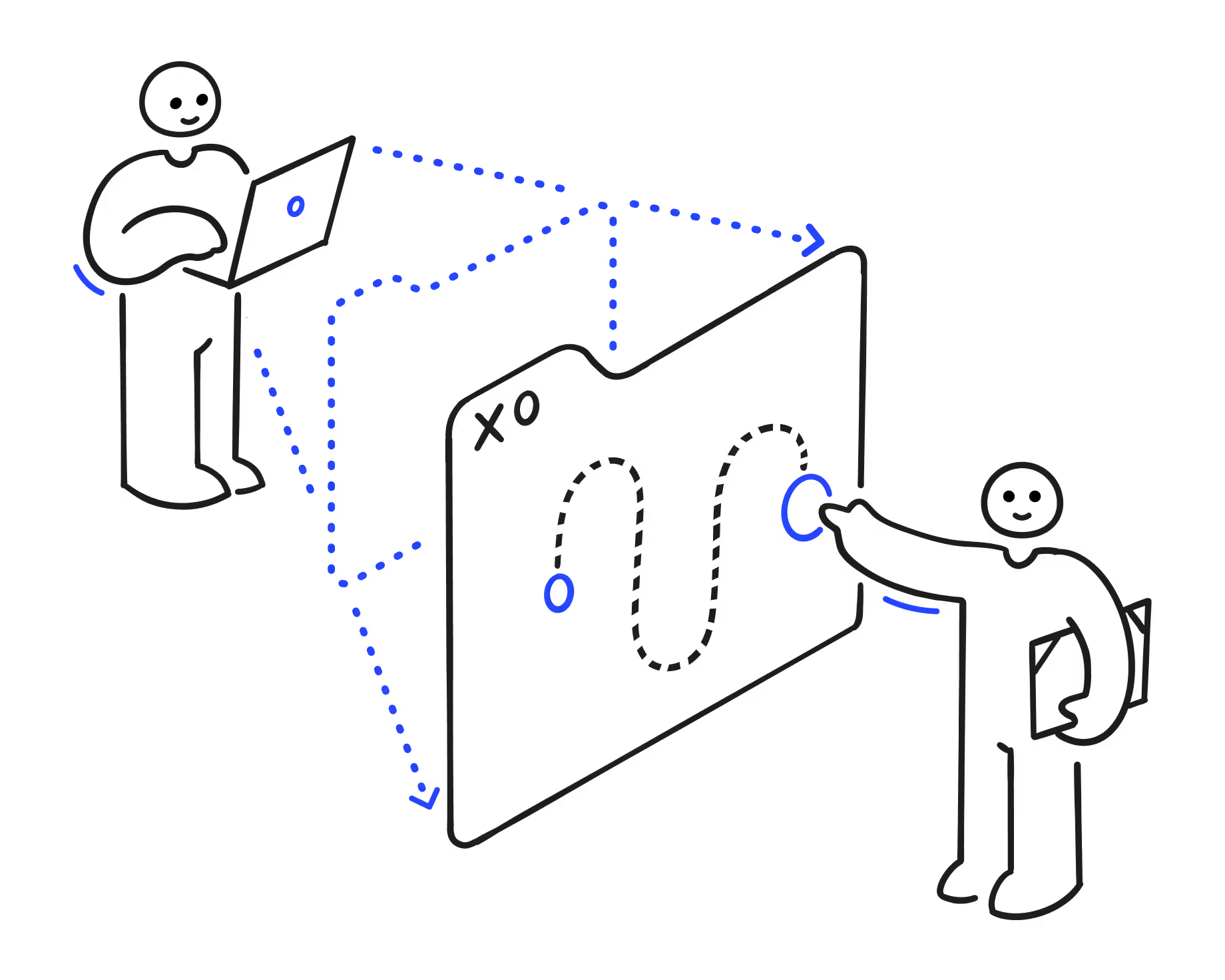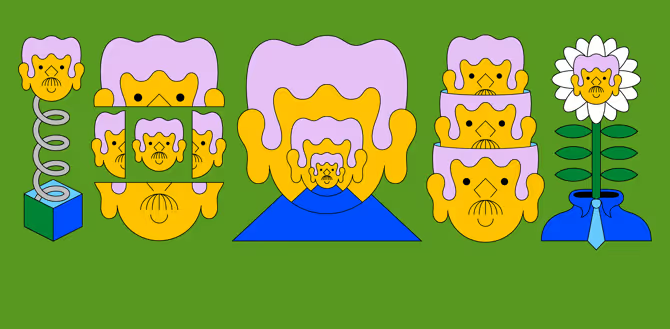How to run your first meeting with your staff as a new manager

Discover Workleap Officevibe's benchmark report on 12 key employee engagement metrics

As the old saying goes, you only get to make a first impression once. That's why as a new manager, your first staff meeting is so important. Chances are employees are feeling curious (or even apprehensive) about having a new supervisor. Your first team meeting offers the perfect opportunity to put people at ease, make a great first impression, and kick things off on the best possible note.
So how exactly do you do that? How do you ensure your introductory meeting with your new team goes off without a hitch and sets you and your people up for success moving forward?
With a bit of preparation, clear objectives, and a flexible meeting agenda, you'll be ready to run your first staff meeting as a new manager like a seasoned pro.
How to prepare for your first staff meeting as a new manager
A critical part of a successful meeting as a new manager is making sure you're well prepared. There are a few things you'll definitely want to do ahead of time to ensure that your first staff meeting is a success and that your new team has the opportunity to get excited about working with you.
Set a clear objective
You can't say a meeting is successful if you don't know what you're trying to accomplish with it. This is why you want to set meeting goals for one-on-ones as well as team meetings. Before your first meeting as a new manager, think about your meeting goals, whether that's breaking the ice with your new team, or talking through your first project.
{emphasize}
Setting meeting goals helps you save time and increase productivity during these moments with your team. Get inspired by our meeting goal examples for every type of meeting!
{emphasize}
Outline important topics to cover
While you don't have to write a script for your meeting, you do want to have a general outline of the topics you'd like to cover.
For example: If your meeting objective is to break the ice with your new team members, you may want to cover topics like your professional background, management style, and leadership philosophy.
Prepare talking points
Once you know what topics you want to cover, you'll also want to prepare a few specific talking points for each topic. Think about what topics will be more suited to a team meeting setting, and which ones might be better covered in one-on-one conversations.
For example: You may want to prepare one or two anecdotes or accomplishments to share with the group, plan an icebreaker exercise, or prepare a meeting check-in activity.
Coordinate team meeting logistics
You want to work out all your meeting details ahead of time. Think about whether you're hosting an in-person or remote meeting, where you'll meet (a physical space or meeting room, or a virtual one), and who needs to be there. Be sure to share those details with your meeting attendees in your calendar invite or as soon as possible.
Ease your new manager nerves
If you're feeling a little nervous or apprehensive about leading your first staff meeting, it's perfectly normal! Doing anything for the first time can be nerve-wracking — and running your initial meeting with your team is no different.
{emphasize}
Tip to handle pre-meeting nerves: Schedule some time in your calendar right before your meeting to put your mind (and nerves) at ease. You can use this moment to go for a walk or do a few deep breathing exercises before your meeting.
{emphasize}
How to run your first team meeting
Once you've done your prep work, the next step in the process is actually running your first team meeting. Here are a few pointers on how to run your first staff meeting that will help you achieve your meeting objective, connect with your team, and lay a solid foundation for a successful and productive team experience.
1. Break the ice with your new team members
This is your new team's first time attending one of your meetings — and, in some cases, may even be their first time meeting you. As mentioned, there may be some curiosity, apprehension, or nerves floating around. Before you dive into your meeting content, take some time to break the ice and put everyone (yourself included!) at ease.
{emphasize}
Icebreaker tip: Start off your meeting with a quick get-to-know-you game or a round of icebreaker questions.
{emphasize}
2. Keep the meeting structure flexible
It's important to have a meeting agenda but you don't need to be so committed to it that you miss an opportunity to have meaningful conversations or interactions with your new team. During your first staff meeting, you definitely want to come prepared with your topics and talking points but also keep things flexible enough to let conversations, questions, or interactions unfold organically.
3. Make it an interactive experience
No one likes to be talked at for an hour straight. Look for ways to involve your team and keep them engaged in the meeting content. This will keep them present during your scheduled time and let them know from the start that you're prioritizing participation and employee engagement.
For example: After you walk your team through your background, you might also go around the room and have each employee introduce themselves and their roles.
4. Keep the meeting a manageable length
It doesn't matter how engaging your first team meeting is, if it goes too long, people are going to have a hard time staying engaged. Try to keep things as concise as possible and aim to keep your total meeting time under an hour. If you have to go longer, make sure to schedule time for breaks.
{emphasize}
Remember: Once you meet with your new team, it's a good idea to meet individually with your team members, too. There are many benefits that come from one-on-one meetings, and keeping that in mind will help you make the best use of each scheduled meeting.
{emphasize}
5. Leave time for employee questions
Your first staff meeting is your first chance to introduce yourself to your new team, but it's also your team's first chance to meet and get to know you. As such, they'll probably have questions, so make sure to leave plenty of time at the end of the meeting for a team Q&A. You'll have the chance to ask all of your own questions during your one-on-one meetings.
{emphasize}
Meeting Q&A tip: Try to see this as an opportunity to get to know your new team's challenges and concerns. You might not have all the answers to their questions, and that's okay! Note them to come back to next time, and make sure to follow up.
{emphasize}
6. Be yourself and show your personality
Part of being an effective manager is connecting on a personal level with your new team. This will make for better communication, stronger trust and respect, and ultimately, better working relationships. Building trust and authentic connections happens when people get to see who you really are. So when you run your first staff meeting, let your personality shine through!
For example: If you're a witty person, crack jokes. If you have a hobby you're passionate about, talk about it. The more “you” you let your employees see, the more quickly you'll connect with them.
7. Have some next steps planned
When you end your meeting, you want everyone to walk away knowing exactly what's expected of them and what comes next. Have a few next steps prepared for after your first staff meeting, and let your employees know what those are. On top of that, you might set a few next steps from whatever comes up during your meeting time.
{emphasize}
Next step ideas: Schedule one-on-one meetings with each new team member, host a training session on new systems and processes, have a brainstorm for planning projects, or book a time to collaboratively create team values and principles.
{emphasize}
A new manager's first team meeting agenda template
Still feeling a little unsure of how to navigate your introduction meeting? Not to worry! Whether you're just getting started with staff meetings, or looking to bring more structure to your scheduled times, meeting templates can help keep you on track. This helps you cover all your agenda items before your team meeting is over.
Here's an example of a first team meeting agenda template to help you visualize the structure of your meeting space, and stay on track when the meeting is actually taking place.
{emphasize}
45-minute first staff meeting agenda
- Greet the team, introduce yourself, and ask your new team members to introduce themselves. (5 mins)
- Do an icebreaker activity. (5 mins)
- Let your team know your expectations as a manager. (10 mins)
- Ask about the team's strengths and challenges, their input on what they'd like to see change as you step into a management role, and what they'd like to stay the same. (15 mins)
- Give the team the opportunity to ask questions. (10 mins)
{emphasize}
How often should you run staff meetings?
Once you've got your first staff meeting under your belt, the next thing on your agenda is determining the right meeting cadence for your team. In other words, as a new manager, how often should you plan to run staff meetings?
There's no magic count for team meetings. Some teams meet every day, some meet once a week, and some meet once a month. The frequency you'll need to host all-team meetings will depend on your team, your objectives, and the projects you're working on.
- Scenario #1: Your team has a looming deadline on a project with many moving parts. So you make sure to have daily team meetings for as long as there are several time-sensitive tasks to manage.
- Scenario #2: You're managing a team of introverts who feel drained after getting all team members together. So you decide to host fewer staff meetings and give everyone more time for focused individual work.
How to manage meeting with your team
When deciding your meeting cadence, it's also important to balance out group sessions with one-on-ones. Depending on the size of your team, what they're working on, and each employee's individual needs, you might opt to run one-on-one meetings more frequently than team meetings, or vice versa. Just make sure that you're making time for both because developing personal relationships with each team member is equally important as creating a positive and healthy team culture.
Generally, you'll want to meet with your team at least weekly or bi-weekly. It's important for you to stay on top of what they're working on, but also to give them dedicated time to raise any challenges they're facing or share their wins. Meeting with your whole team is an opportunity for alignment and connection, maintaining that sense of collective purpose.
FAQ on your first meeting with employees as a new manager
As a new manager, your first meeting with employees sets the tone for your working relationship and establishes the foundation for a successful team dynamic. It's natural to have questions about how to make this initial meeting meaningful and effective.
In this FAQ section, we've compiled answers to common queries you may have about your first meeting with employees.
By following these tips, you'll be well-prepared to navigate this important milestone and build a positive rapport with your team members. And remember, these tips are just as good for any other future meetings (not just the first ones!).
What should I include in the agenda for my first meeting with employees as a new manager?
In your first team meeting with employees as a new manager, it's important to have a well-planned agenda. Start with a warm welcome and introductions, followed by sharing a bit about your background and experience. Discuss the team's purpose and goals, establish expectations and responsibilities, and provide time for questions and open discussion.
How can I effectively introduce myself and establish a positive relationship with my employees during the first meeting?
To establish a positive relationship with your team members, be approachable and friendly. Show genuine interest in their work and contributions, and actively listen to what they have to say. Share your leadership philosophy and values to give them an idea of your approach. Express your commitment to supporting the team's success and creating a positive work environment.
What strategies can I use to make employees feel comfortable and engaged during the first meeting?
Making team members feel comfortable and engaged during the first team meeting is crucial. Create a welcoming and inclusive environment where everyone feels valued. Encourage team members to participate and be actively involved by using icebreaker activities or team-building exercises. Acknowledge and appreciate their contributions, and be transparent and honest in your communication.
How should I address any concerns or anxieties that employees may have during the first meeting?
Addressing any concerns or anxieties team members may have is important to foster a positive atmosphere. Encourage open discussion and questions, and respond to their feedback with transparency and honesty. Acknowledge their concerns and empathize with their feelings. Offer reassurance and support, and make a commitment to address their concerns in future meetings.
What are some key communication techniques I should employ to ensure a successful first meeting with employees?
Communication is key to running a successful first team meeting. Use clear and concise language to convey your message effectively. Maintain eye contact and positive body language to show your attentiveness and interest. Practice active listening and ask follow-up questions to ensure understanding. Provide context and examples to enhance understanding, and consider using visual aids or presentations to convey information effectively.
How can I set clear expectations and goals for employees during the first meeting as a new manager?
As a new manager, it's important to set clear expectations and goals for your employees during your first meeting. Effectively communicate your performance expectations, encompassing both individual responsibilities and contributions to overall team goals, in a clear and concise manner. Collaborate with each employee to establish measurable goals that align with their skills and aspirations. Follow up on goal progression and provide consistent support as this will lay the foundation for a successful and high-performing team.
What steps can I take to encourage open dialogue and active participation from employees in the first meeting?
Encouraging open dialogue and active participation during meetings creates an inclusive and collaborative environment. Create a safe space for open discussion, ask open-ended questions to encourage input, and value diverse perspectives and ideas. Encourage team members to share their thoughts and opinions, and recognize and appreciate their contributions during the meeting.
How do I handle any conflicts or disagreements that arise during the first meeting with employees?
If conflicts or disagreements arise during the first meeting, handle these difficult conversations with empathy. Listen to all parties involved in a respectful manner and seek to understand the root cause of the conflict. Facilitate a constructive dialogue to find common ground and encourage compromise. If needed, follow up with individuals privately to address any lingering concerns with all parties involved in a respectful manner.
Should I discuss individual performance or address any performance issues during the first meeting as a new manager?
During the first team meeting, especially with new team members, it's best that you set expectations and goals rather than address individual performance issues. If there are immediate performance concerns, address them privately. Express your commitment to providing regular feedback and support for employee growth. Drive home the importance of open communication regarding performance throughout the meeting.
What follow-up actions should I take after the first meeting with new team members to maintain communication and address any outstanding concerns or questions?
After the first team meeting, always follow up to maintain communication and address any outstanding concerns or questions. Send a follow-up email summarizing the key points discussed and any successive action items. Schedule regular team meetings to keep communication channels open. Encourage employees to approach you with any concerns or questions they may have. Conduct one-on-one meetings to address individual needs or concerns, and seek feedback from team members on the meeting and their overall experience.
Your first meeting with employees as a new manager is the best opportunity to create a positive working relationship and collaborative work environment. It's vital to embrace this opportunity to connect with your team members, understand their perspectives, and inspire them to achieve shared goals. Plus, this will have a huge (positive) impact on team culture!
Give HR and managers the clarity, confidence, and connection to lead better every day.












